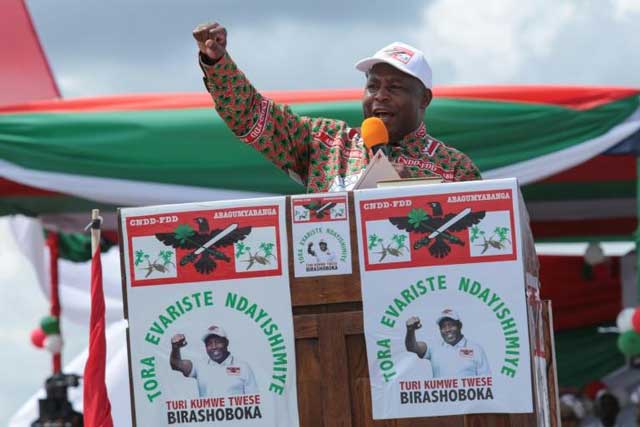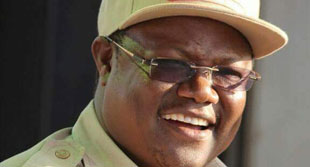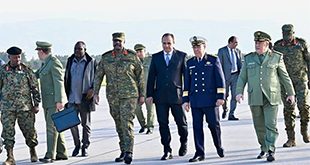
Nairobi, Kenya | AFP | Burundi plans to hold a presidential election Wednesday that will turn the page on the tumultuous tenure of Pierre Nkurunziza, in power since 2005.
Nkurunziza’s controversial decision to seek a third term in 2015 plunged Burundi into crisis, and the associated unrest killed 1,200 people and saw 400,000 flee the country.
Several of these exiles, speaking on condition of anonymity for safety reasons, told AFP they have little hope Wednesday’s vote will bring real change.
Even though Nkurunziza is stepping down, they expect him to be replaced by General Evariste Ndayishimiye, an army general hand-picked by the ruling CNDD-FDD party as their candidate.
– Richard, 38, in Kigali –
Though life in exile is difficult, Richard manages to smile as he describes why he fled — and why he has little hope of returning anytime soon.
“I was among the young people who were strongly opposed to a third term for President Nkurunziza. We organised protests. But we weren’t prepared for the level of violence that has befallen us.
“The police and the army tracked us down. They killed many people. They were looking for me too.
“I planned my escape for Rwanda and left everything behind. I’ve been living in Rwanda since June 2015.
“In Burundi, I was project manager for a water company. Here in Rwanda I work as a waiter in a restaurant to make ends meet.
“Life is hard but we persevere. I left many relatives behind in Burundi and I pray they’ll be fine. Here I fell in love with my wife, who is also a refugee. We have four children now.
“Returning to Burundi is my ultimate dream but I know it’s impossible. The circumstances that forced me to become a refugee are still in place, people are still afraid… because the ruling party controls everything.”
– Jeanette, 35, in Rotterdam –
A former banker, and politically active mother-of-five, Jeanette had to adapt fast to a new life abroad after a narrow escape from Burundi.
“It was May 26 (2015) and our protest had just been broken up by the police. Suddenly, Godefroid Bizimana’s (number two in the police force) car pulled up and he ordered two officers to arrest me.
“They were arguing about where to take me… the officer closest asked me if I wanted to live. He said, ‘Run, madame’.
Jeanette went to ground, hiding a few days before fleeing to Rwanda, and then onward to the Netherlands.
“It wasn’t easy. I had two children with me and was pregnant when I arrived in the Netherlands on July 1, 2015.
“I was welcomed by a Burundian family in Rotterdam, then I applied for political asylum, which was approved because my case was straightforward to verify.
“Refugees are treated well in the Netherlands. I was given a house, and a small grant to support us. But the first years were very difficult because we were thrust unwillingly into another world, another life.
“I spent two years studying Dutch… and eventually my husband and another child, who had stayed together in Burundi, joined us.
“I have no reason to hope that I might return home soon. There’s nothing to reassure me of that: not the level of violence surrounding these elections, nor the way they’ve been organised. Nothing.”
– Fabien, 37, in Nairobi –
Fabien speaks softly and carefully. He sees no reason to be optimistic.
“I arrived in Nairobi in January 2016. Before, I was a history teacher at a high school.
“I lived in a contested neighbourhood of Bujumbura. I wasn’t in favour of Nkurunziza’s candidacy but I wasn’t motivated to join the protest movement either: I thought it was badly organised.
“I was tired of the situation, especially the economic situation. I left to find a better life elsewhere.
“My wife and my two children are still in Burundi. It’s very difficult but we don’t have much choice.
“I work for a voice-dubbing company but there isn’t a lot of work at the moment.
“Because I left, I am now considered a fugitive, belonging to the opposition. I’ve made two quick trips back to Burundi since then, undercover. There, I stay in a neighbourhood where people don’t know me.
“I am pretty sure that the CNDD-FDD will win, especially with the current electoral commission.
“In the next five to 10 years, I don’t really see any change. My goal is more to bring my family here, than return to Burundi.”
– Francis, 37, in Kigali –
Francis is tall, a little shy and still struck by how his life has changed.
“I fled in December 2015 because the Imbonerakure (the ruling party’s youth league) were looking for me to eliminate me. I left Burundi by myself and arrived in Rwanda with absolutely nothing.
“I was studying IT at the University of Burundi and only had a year to go. I looked for work (in that field) here but in vain, so I found this job as a taxi driver.
“Sometimes I wonder how I ended up living a life so different to the one I envisioned as a student. It’s crazy.
“Life in Rwanda isn’t easy, because we’re not from here. We’re foreigners, not citizens.
“My goal is to finish school and get a solid job that will guarantee me a stable income.
“Of course I hope to return to Burundi one day. But with the elections, and the risk of violence, it’s not even worth thinking about.
“I’ve cut all ties to my family in Burundi, because I don’t want to get them in trouble.”
 The Independent Uganda: You get the Truth we Pay the Price
The Independent Uganda: You get the Truth we Pay the Price


